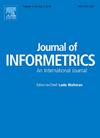Collaborating with top scientists may not improve paper novelty: A causal analysis based on the propensity score matching method
IF 3.4
2区 管理学
Q2 COMPUTER SCIENCE, INTERDISCIPLINARY APPLICATIONS
引用次数: 0
Abstract
In previous collaboration studies, a majority of them concentrate on examining cooperation models, often overlooking the pivotal role played by a Top Scientist (TS) in scientific advancements. As far as my knowledge extends, only one relevant work delves into the correlation between innovation and collaboration with TSs, and no research has explored this relationship from a causal perspective. More precisely, previous studies suffer from several limitations in their examination of this topic: 1) Existing studies on Papers' Novelty (PN) primarily focus on calculating methods, with limited exploration of its relationship with scientific cooperation. 2) Research that has explored the link between collaboration with TSs and output innovation often adopts a correlational perspective, lacking a causal analysis that could correct for potential confounding factors. 3) Previous methodologies overlook the attributes of citation networks as potential confounding factors, a crucial consideration in identifying identical papers in causal analyses. 4) The impact of disciplinary diversity of papers on the innovation output when collaborating with TSs is often overlooked in prior research. To address these limitations, we conduct a causal analysis of publications in three subfields of computer science from the Web of Science (WoS) database to demonstrate the impact of collaborating with TSs on PN. Specifically, to tackle Limitations 1) and 2), we employ PN as a metric to assess the quality of academic output and explore its causal relationship with collaborating with TSs using the Propensity Score Matching (PSM) method. To address Limitation 3), we comprehensively consider potential confounding factors influencing PSM matching by further incorporating the attributes of citation networks, thereby minimizing selection bias. To deal with Limitation 4), we not only focus on the overall treatment effect but also delve into the treatment effect of intra-disciplinary and interdisciplinary collaboration modes. The research findings indicate that the papers collaborating with TSs exhibit lower PN compared to those without the participation of TSs. This suggests that collaboration with TSs may come at the cost of reduced novelty. This discovery prompts profound reflections on scientific collaboration, emphasizing the challenges and trade-offs that may exist in collaboration.
与顶尖科学家合作未必能提高论文的新颖性:基于倾向分数匹配法的因果分析
在以往的合作研究中,大多数研究都集中于考察合作模式,往往忽视了顶尖科学家(TS)在科学进步中所发挥的关键作用。据我所知,只有一项相关研究深入探讨了创新与与顶级科学家合作之间的相关性,而且没有任何研究从因果角度探讨了这种关系。更确切地说,以往的研究在探讨这一主题时存在几个局限性:1) 现有关于论文新颖性(PN)的研究主要集中在计算方法上,对其与科研合作关系的探讨有限。2)探讨与技术服务公司合作与产出创新之间关系的研究往往采用相关性视角,缺乏可纠正潜在混杂因素的因果分析。3) 以往的研究方法忽视了引文网络属性这一潜在的混杂因素,而这是在因果分析中识别相同论文的关键因素。4) 以往的研究往往忽视了与技术服务机构合作时,论文的学科多样性对创新产出的影响。为了解决这些局限性,我们对科学网(WoS)数据库中计算机科学三个子领域的论文进行了因果分析,以证明与 TS 合作对 PN 的影响。具体来说,针对局限 1) 和 2),我们采用 PN 作为评估学术成果质量的指标,并使用倾向得分匹配法 (PSM) 探讨 PN 与与 TS 合作的因果关系。针对局限性 3),我们通过进一步纳入引文网络的属性,全面考虑了影响 PSM 匹配的潜在混杂因素,从而将选择偏差降至最低。针对局限 4),我们不仅关注整体处理效应,还深入研究了学科内和跨学科合作模式的处理效应。研究结果表明,与没有科技服务机构参与的论文相比,与科技服务机构合作的论文显示出较低的PN。这表明,与技术服务人员的合作可能会以降低新颖性为代价。这一发现引发了对科学合作的深刻反思,强调了合作中可能存在的挑战和权衡。
本文章由计算机程序翻译,如有差异,请以英文原文为准。
求助全文
约1分钟内获得全文
求助全文
来源期刊

Journal of Informetrics
Social Sciences-Library and Information Sciences
CiteScore
6.40
自引率
16.20%
发文量
95
期刊介绍:
Journal of Informetrics (JOI) publishes rigorous high-quality research on quantitative aspects of information science. The main focus of the journal is on topics in bibliometrics, scientometrics, webometrics, patentometrics, altmetrics and research evaluation. Contributions studying informetric problems using methods from other quantitative fields, such as mathematics, statistics, computer science, economics and econometrics, and network science, are especially encouraged. JOI publishes both theoretical and empirical work. In general, case studies, for instance a bibliometric analysis focusing on a specific research field or a specific country, are not considered suitable for publication in JOI, unless they contain innovative methodological elements.
 求助内容:
求助内容: 应助结果提醒方式:
应助结果提醒方式:


